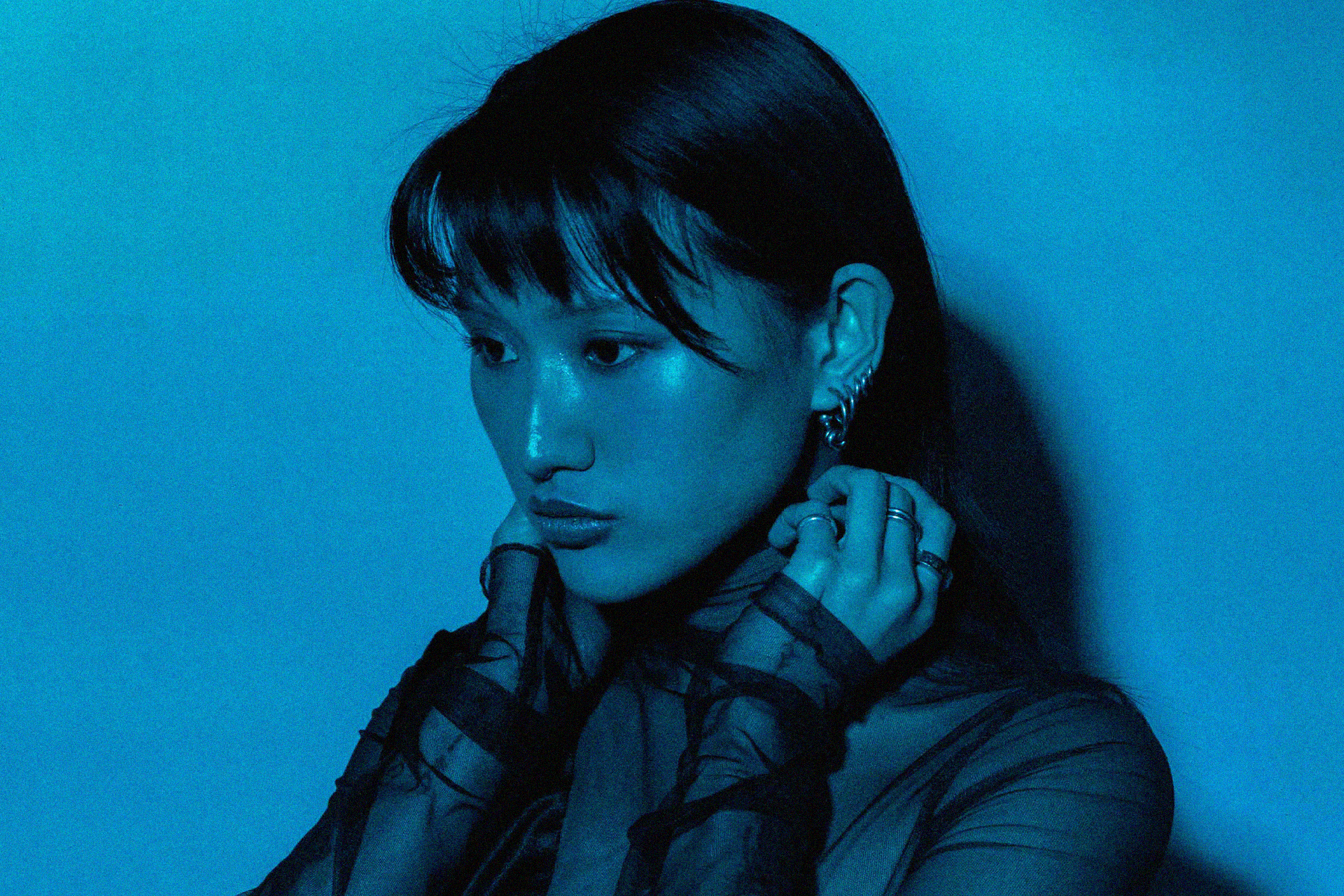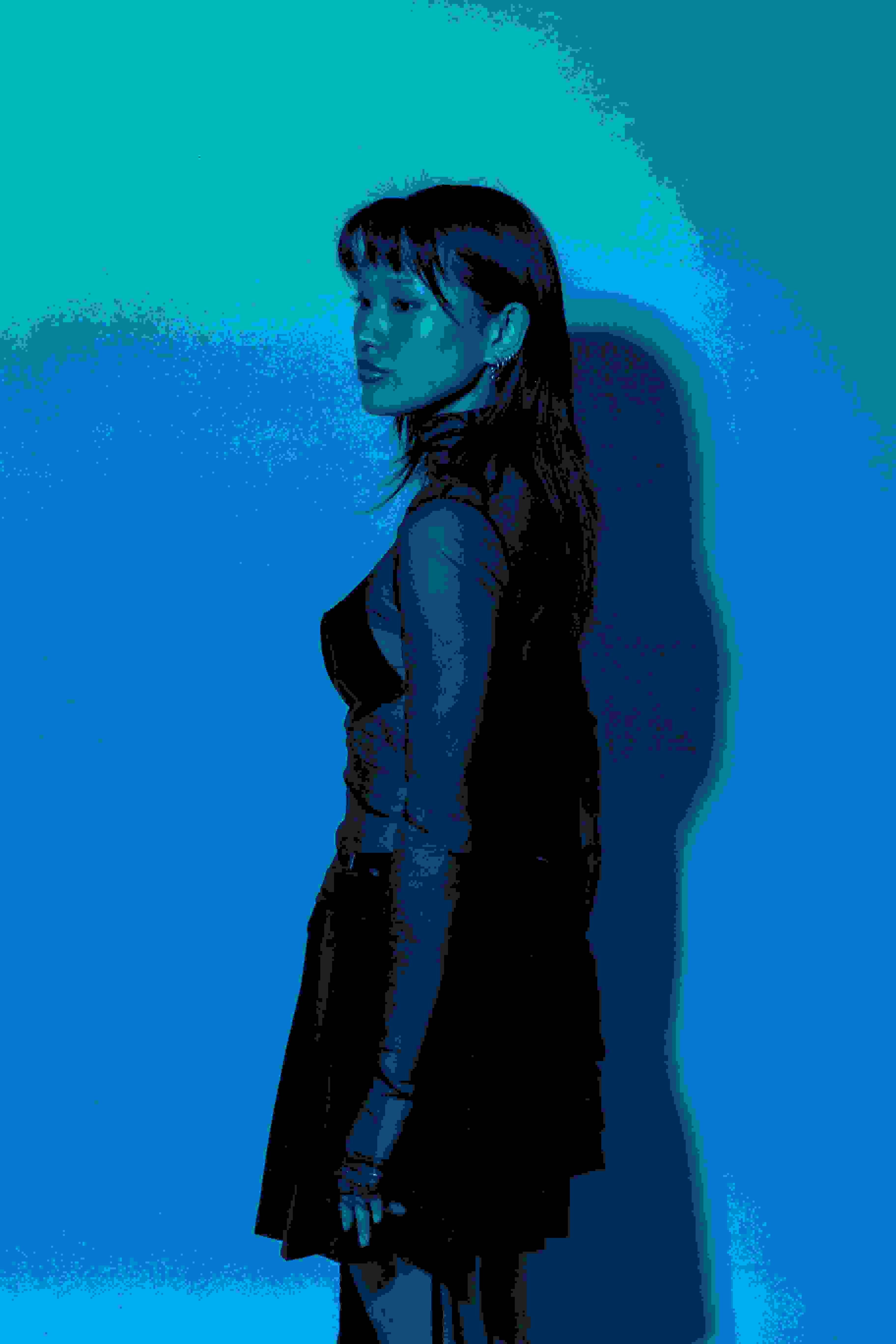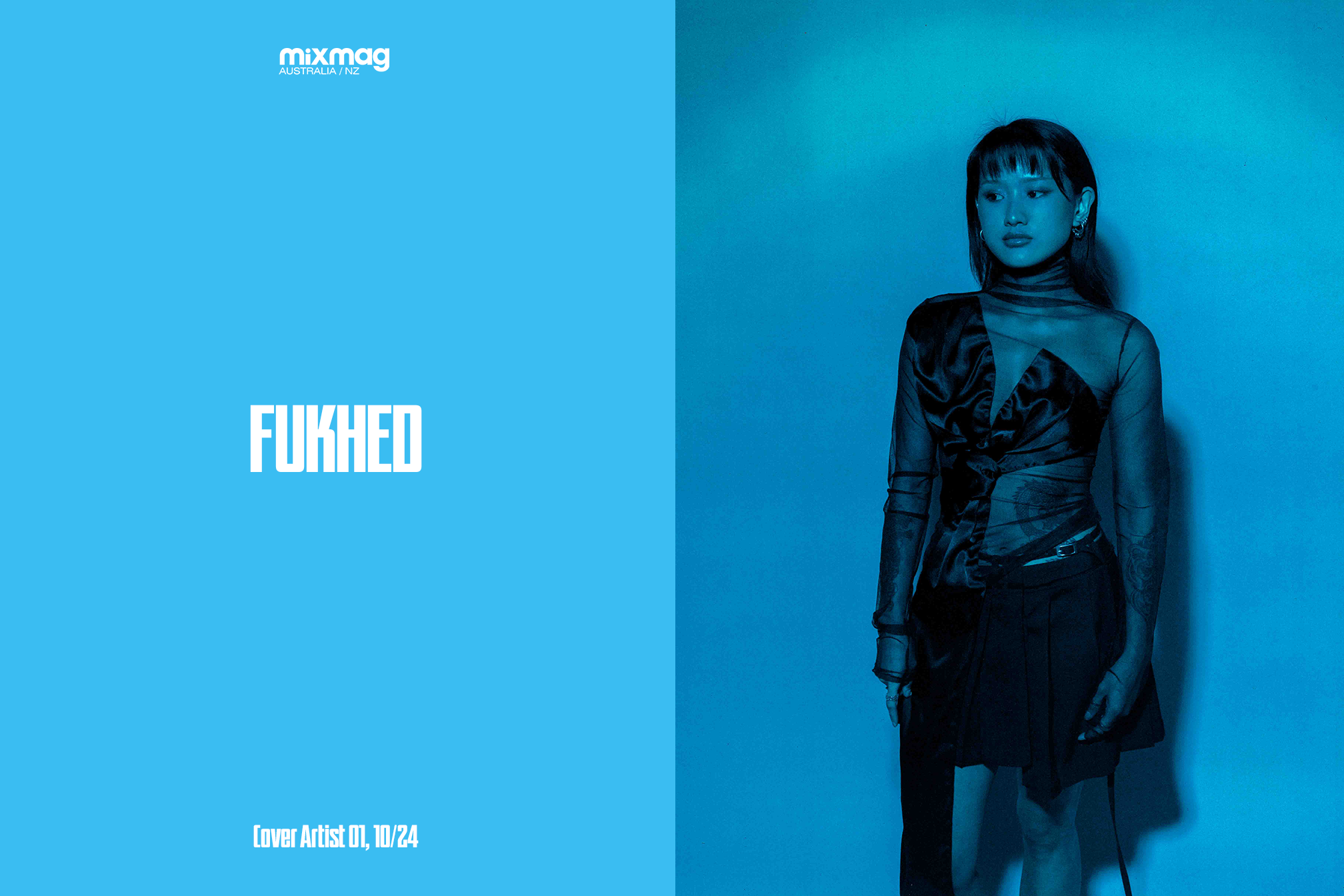 COVER STARS
COVER STARS
“What I like is all I have,” the meteoric rise of FUKHED
The Meanjin turned Eora-based artist is moving, quick. She is Mixmag ANZ's Covert Artist for October 2024.
“I just didn’t want to be found on Instagram,” she explained to me calmly.
“Normal ‘fuckhead’ was taken.”
In a world dominated by headlines, increasingly brief stints of virality and an almost defining need for artists to stand out, it’s very unlikely that if you listen to Australian dance music, you’ve not heard of FUKHED.
The now Eora-based DJ and budding producer stormed out of the gates a little over two years ago, following a sudden move from her hometown of Meanjin/Brisbane. From early appearances on FBi Radio to a series of warehouse adjacent shows and outdoor ‘raves’, to featuring on lineups for Beyond The Valley, Field Day, and now a Boiler Room on the horizon, FUKHED has been a success story that few in the country’s dance scene can rival.
In amongst preparations for aforementioned Boiler Room, the recovery of a recent stint of shows in Japan, and a clearly very exhausting online security debacle, FUKHED, real name Lynn, met me to speak in the Astral People studio, right at one of Eora’s most reliable arteries, Oxford St.
It was the picture of “the DJ lifestyle”, but as I would soon find out, Lynn was in so many ways anything but.
FUKHED is Mixmag Australia / NZ’s October 2024 Cover Artist.
While her name could, to more fist-shaking inclined members of the dance community, conjur images of a culture out of control or dominated by memes, Lynn’s name has acted as a clear and effective means of weeding people out who clearly aren’t worth her time.
Though still the topic of its fair share of jokes and viral moments, FUKHED is in so many ways the perfect embodiment of a younger generations’ interaction with and total disregard for social media. Artists are no longer just performers or musicians, they’re hosts, journalists, photographers and entire PR teams on a near daily basis.
To some, that may sound like a horrible burden, but for FUKHED, it’s an opportunity.
“Having control over the way everything looks, or the way that you roll things out, I think allows you to be creative and not have it be such a chore”, FUKHED explained.
“In terms of Tiktok, I do understand it, [but] I don't think I'm there yet to use it,” she continued. “I'm not ready to be that vulnerable yet.”
Music has always been a huge part of FUKHED’s life, but a DJ career is only something she’s aspired to very recently. Growing up in Meanjin, Lynn pursued a career in fashion, and began styling music videos. For her, a combination of style and music was all she wanted. “If I could combine them in whatever I'm doing, then that's the goal,” she reflected.
FUKHED’s work saw her working with a great number of musicians, but none more so than Meanjin-based rapper Nerve. She began styling him exclusively, and found herself in even more inspiring circumstances. Soon, her focus turned from her work behind the camera, to the possibilities in front of it.
“I was surrounded by just the most amazing, talented DJs and producers. We'd go to parties and I would think ‘oh, I don't want to just be standing here, I want to play. I just want to see what it's like,’” she told me with a glint in her eye. “I say this in every interview, always shout out Jonathon Jackson, he taught me how to DJ. From there, it just kept going.”
FUKHED’s DJ career in Meanjin was relatively shortlived however, as she’d quickly become known as an Eora-based artist. Although she may not have fully hid her stride in her hometown however, she was all too ready to represent the community she still holds so dear. “The way that everyone supported each other, it's really genuine and really wholesome. Even when I moved, I never lost contact,” she reminisced.
FUKHED’s move, not only into a career of DJing, but elsewhere in Australia, was a split second design that in many ways mirrors the radical success of artists in the world’s blossoming dance culture. “I was actually filming a music video Nerve in Tweed Heads, like on the sunflower fields. That same day, I had a little backpack, and I decided to make the move down to Sydney.”

Dance music has never been more accessible. Whether to listen to, participate in, to perform or to produce, technology, social media and the presence of DJ culture in pop culture has made making a split second decision to chase music easier than ever before. For many, this is a downside. An easily critiqueable part of a culture formed largely around the idea of “living in the moment”, now publicised heavily online and in our day to day lives.
While Lynn’s move may have been one made somewhat on a whim, her goals and approach to making it work were not.
“I told myself [that] I'll give myself six months. If I could do what I did in Brisbane here, you know, start from scratch, then I'll stay, even if it wasn't for music.”
It wasn’t long before she found her defining moment.
“At this party for Momentum, [I remember] looking up after ending on this Pendulum song (Voodoo People [Remix]), and everyone was on each other’s shoulders. ‘Okay, this could be something.’”
FUKHED & I spoke about the ‘defining moment’ that set her on the path to being a career DJ. All too regularly the conversation turns to “the way music connects people on the dance floor”, or “leaving your problems at the door”, but FUKHED was keen to differentiate what she felt.
“It’s like a collective effervescence,” she explained. “It's the sense of unity with everyone in a crowd that makes me so addicted to this.”
In hindsight, Lynn went on to explain, while these moments made her certain of how much she wanted to dedicate herself to DJing and dance culture, it was only once her bookings started to really pick up that she started to entertain the idea of turning it into a career. “After Beyond The Valley, Field Day ad then working towards putting out ‘No C No A’, I was like ‘okay, this is going to be my career.’”
But while the life of a DJ is one now very glamorised by pop culture and on social media, FUKHED made a point ahead of time of wanting to enter into a conversation around mental health.
Lynn explained as she had arrived at our interview that her week thus far had been almost entirely dominated by a breach of her privacy. She was being blackmailed, by someone who had gained access to private information and photographs, and who were sharing them among her friends, family and colleagues.
Lynn’s success had, as pointed out by her, clearly attracted some very unwanted attention which was now seeking to exploit her for profit. Our conversation around mental health could not have been more importantly timed.
“Everyone's going through the same thing,” she said, “and the deeper you do get into [music], I feel like it's a lot easier for you to feel more isolated. You’re lonely because you know that you have to be so locked into your own project, you are the front man.”
While Lynn was clear that many people had offered to help, and were ultimately successful in dealing with this breach of her privacy, she clearly and very understandably had concerns of the way in which a work life balance can take a toll on someone so focused on their work.
“Outside of music, you’re doing press shots, music videos, all the business stuff, prepping for a show… For me, being a new producer, I’m so deep in that, and it’s hard to shift [your priorities].”
“[Mental health] isn’t a conversation I feel like I have often with everyone within the scene, because it’s very businessy a lot of the time when you go to certain events or green rooms. You’re not going to sit there and be like ‘yeah I was depressed’.
I don't think it's a lack of regard at all, but I definitely don't think it's prioritised.”

In 20s, still relatively new to the world of being a touring artist, Lynn has had to adapt and learn to become strong in the face of intense pressure and adversity. In a world where, again, the life of a DJ is so publicised and regularly so sought after, Lynn’s success isn’t some ‘by chance’ happening. It was clear in this portion of our conversation that she was where she is because she’s resilient and able to handle the pressure that comes with making such a drastic change as chasing after music.
“I didn't come from a background where you'd expect me to be doing what I'm doing today,” she laughed.
“I’m not classically trained in anything. Not in fashion, not music.
All I have is what feels good and what I like. That’s all I have.”
With so much ahead of her and already under her belt, FUKHED is someone very clearly in the public eye. Social media and dance music has become an increasingly difficult network of gatekeeping, community policing and criticism, both for better and for worse. As FUKHED sat before me, as we spoke about the hurdles and excitements she’s experienced in her comparatively short time in that public eye, her reflections and comments became all the more focused on the opportunities ahead of her, rather than what she already had under her belt.
Even as we spoke about her looming Boiler Room appearance, she was quick to claim that she was by no means ready for Europe. We discussed her feeling of responsibility as an artist with Asian heritage, to which she said that she hoped to have a platform to become a bigger voice for aspiring Asian DJs and producers.
What FUKHED has brought to the way that she works, relates to her audience and steadily grows herself into the artist that she aspires to, is an appreciation for where she is and what she’s been able to learn.
“If I could do this, then I know other people can, because I know how my brain works.”
With her latest single ‘4303’ having just released, and a slew of massive Summer shows on the horizon, FUKHED is a champion for a new wave of dance music stars that make it happen for themselves.
-
Jack Colquhoun is Mixmag ANZ's Managing Editor, find him on Instagram.


